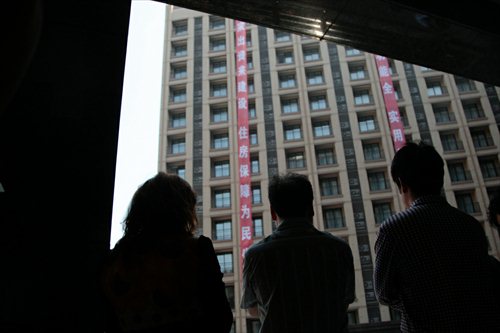HOME >> METRO SHANGHAI
Shanghai graduates battle to find reasonable accommodation
Source:Global Times Published: 2016/6/26 18:23:01

A young woman passes by a real estate agency advertising rental properties. Photo: IC
While graduates in Shanghai yearn for independence, a recent survey by the Youth Daily revealed that 60 percent of them have to share accommodation and many wind up sharing apartments with strangers.
The Youth Daily online survey involved 346 respondents from college graduates working in Shanghai.
Of those sharing apartments, 40 percent live with friends. Shanghai University graduate Li explained: "Renting apartments with friends can save money and we can help each other sometimes. All things being equal I enjoy living with my friends."
While sharing apartments saves money and is sociable, finding suitable people can be difficult. And the minute a good roommate gets a new job or leaves Shanghai, the hunt for a replacement begins all over again. The survey showed that 14 percent of these young tenants share apartments with strangers they have contacted online. And another 9 percent live in subdivided accommodation where flimsy walls have been erected to create extra rooms.
The main attraction
This style of accommodation is cheap and that was the main attraction for Wu, a graduate of the University of Shanghai for Science and Technology. With no experience at renting and not wanting to pay real estate agency fees, after scouring the Internet he found he could only afford a subdivided unit.
"Although these places are chancy and illegal the rent they charge is all I can afford," he said.
This survey revealed that none of the respondents lived in apartments owned by family or friends - some respondents suggested this sort of arrangement could easily lead to conflicts.
Twelve percent of those surveyed rented specially designed share apartments through websites like Ziroom, qk365.com, and Mofang Apartment (which also means the tenants will wind up sharing with people they don't know). Just six respondents out of 346 rented government-backed accommodation and only 5.2 percent were living in accommodation provided by their employers.

Tenants check Shanghai's government-backed accommodation in Putuo district. Photo: CFP
Some 20 percent of those surveyed pay between 11 and 20 percent of their income in rent; 30 percent pay between 21 and 30 percent of their income in rent; another 20 percent pay between 31 and 40 percent of their income in rent; and 11 percent were paying more than half of their income in rent. Only three people reported paying 10 percent or less of their salaries in rent.
In cash terms the survey showed that 30 percent of the respondents were paying between 2,000 yuan ($302) and 3,000 yuan on rent every month; 28 percent paid between 1,500 and 2,000 yuan; 6.9 percent paid more than 4,000 yuan; and 2.5 percent paid less than 1,000 yuan.
The Australian scene
How does this compare to other countries? According to Hu Fang, a Global Chinese Broadcasting Cooperation correspondent in Australia, young college students in Australia often share homes with their friends to save money.
An average rent for a room (including water, gas and electricity payments) would cost between AU$200-300 ($150-224) a week. On average a new graduate can expect to earn about AU$600-800 a week and can expect to pay between a third and half of that in rent.
More than half of the Shanghai graduates surveyed thought that rents in the city were too high - 52.8 percent thought that if rents were lower they would have a much-improved quality of life. Another 40 percent reported it was a struggle to pay the rent every month and just 4.6 percent felt that their rents were acceptable.
The survey also showed that 46 percent of these young tenants felt the most important thing in rented accommodation was having personal space. The second most important factor was the distance between their apartments and their work. The third important factor was the cost - apparently décor and flatmates' personalities are not vital considerations.
While 55 percent of those surveyed spent two to three weeks to find suitable accommodation, 40 percent found a place within a week but 10 percent took a month or longer.
Nearly 37 percent of the respondents used real estate agents to find their accommodation and 80 percent of them thought the commission the agents charged was acceptable. Four percent reported problems with agency rentals.
Using apps
Mobile phone apps were the platforms 20.7 percent of the respondents used to find their accommodation. One new graduate surnamed Dong said apps were a really good way of finding an apartment. "The apps show the kind of apartment, the district and the rent." However only 28 percent of the respondents thought the apps were trustworthy and 31 percent gave apps the thumbs up because they didn't charge commission. Twenty-one percent said they wouldn't use apps to find an apartment.
Of those surveyed 13.7 percent found accommodation through the Internet. Of these 30 percent believed that the Internet posts offered cheaper rents than the market was offering. Another 30 percent admitted they were looking for friends as well as accommodation in their Internet searches. However 20 percent of the respondents thought it was dangerous to move in with strangers.
Compiled by Huang Meitao based on a story from the Youth Daily
Newspaper headline: Home sweet home!
Posted in: Metro Shanghai, City Panorama